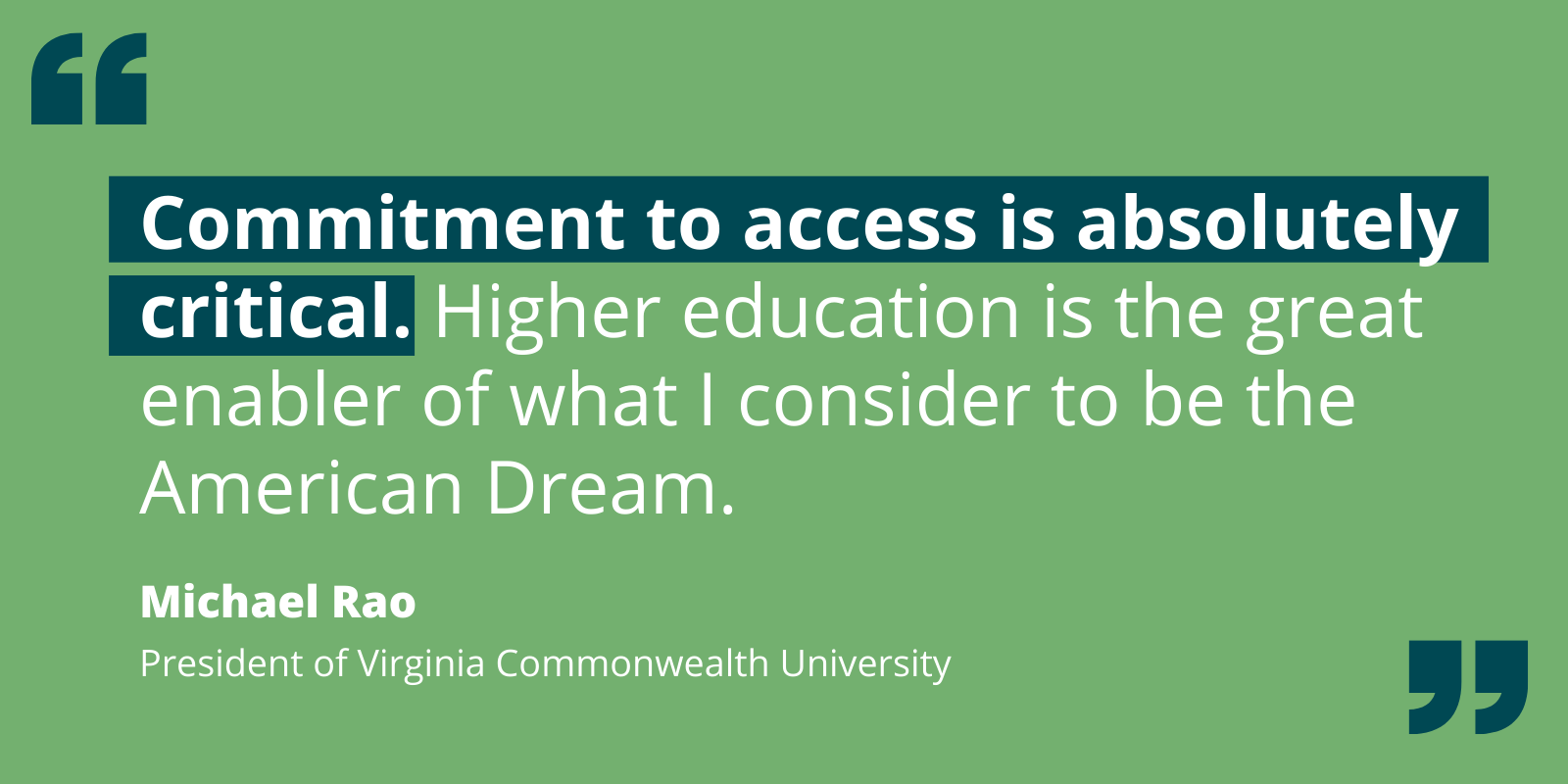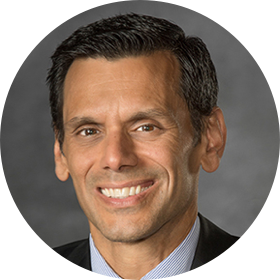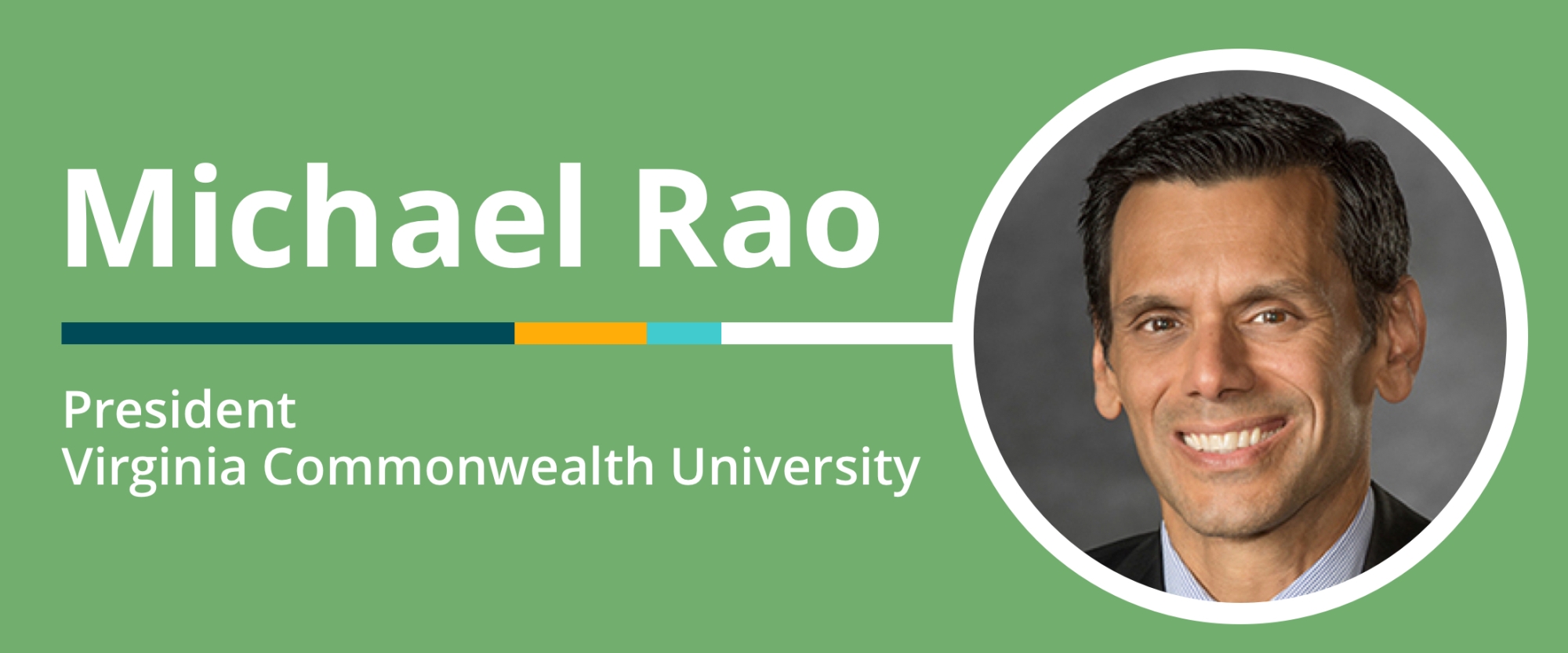We were happy to have Dr. Michael Rao, President of Virginia Commonwealth University, as our guest for the Weekly Wisdom Podcast. He spoke about raising his awareness of the education that most students want and need, the considerations involved in returning to campus during the pandemic, and how to be a more effective and efficient leader.
Elitism vs. the Neglected Majority
President Rao's leadership history has been unconventional. An academic program planner who became a community college president at age 28, he went on to lead two public universities before arriving at Virginia Commonwealth, an institution with a deep history of medical research. We asked what hurdles he overcame to assume leadership at what's considered an elite university.
"One of the things I love about the University Innovation Alliance is I think you're really trying to release that hold on what constitutes elite and prestige," he told us. "It's for a very small population, and what we're doing is focusing on the vast majority of people who have needs." He credited Dale Parnell's book The Neglected Majority for opening his eyes to the need for broader access, adding, "I think it applies to all levels, including major research universities. And commitment to access is absolutely critical. Higher education is the great enabler of what I consider to be the American Dream."

President Rao recalled his job interview at VCU. "I was talking more about what I would do instead of who I am and why I'm so qualified," he said. "I just talked about trying to make this great place more meaningful and impactful to society, about a graduation rate, about research volume. And I talked a lot about medical care and the importance of safety net hospitals. And whatever happened, it worked. There was a board in place that was interested in results.
"But I think the status stuff, you got to watch out for it," he added. "All you'll do is continue to draw this line between 'elite' and other institutions."
Listening to Student Needs
President Rao shared his thoughts on how to make the higher ed ecosystem more effective in meeting student needs.
"It's really very, very important for us to rethink all of this," he stated. "For right now, the bachelor's degree is the standard. We've got to put in place welcoming pathways for everybody, no matter who they are, no matter what their backgrounds are. The truth of the matter is the best colleges are not necessarily just the colleges that have students with the highest SAT scores. An SAT score, an ACT score is not the best determination of how well a student will ultimately do. Ultimately what matters is what's going to happen after college. What's the impact that you're going to have on society and other people?"
President Rao shared a memorable conversation with two undergrads who approached him early in his tenure at VCU with the question, "Can we try to influence you on the college experience?" He was willing to hear them out, recalling, "What they said is, 'Can college be less of sitting in a classroom listening to a talking head, having to memorize what we hear, and then regurgitate it back so that we can forget it a year later?' And I said, 'Well, what would you do?' And they said, 'Where we learn is where we're engaged. Where we have a sense of why we're learning what we're learning, and how it benefits other people, and how it's going to benefit me in my ability to really be a major influence on society.' That totally changed all of my goals. Not immediately, but in the next year I'm, like, what they told me is really important and very, very valuable."
Remote or Return?
President Rao misses the crowded campus and busy hospitals, but he recognizes that COVID is still with us and that returning to school and work will have to be phased in. He walked us through his approach:
"What you really want to focus on is what is your job, and where do we need you? Where do students need you? Where do the employees who may depend on you need you? And listen, if you can be more productive at home, and achieve greater balance in your life, and the job is fitting to that, then do it. But if you are a nurse, we need you to come in. If you are teaching freshman courses, we may need you to come in. I think those blanket kinds of things are useless. We need to look at everybody's situation individually. And that's what I get worried about in higher education sometimes, especially larger institutions, is we get lost in process. Think about the student, think about in my case the patient, and if it matters, then do the right thing for them."
Healthy Leadership Habits
Moving from policy to practicalities, we asked President Rao for a few examples of how he gets through the day-to-day of a challenging job.
"I try to know what's coming a few days in advance," he told us. "You can't usually exercise the day of a board meeting, 'cause you're starting so early. I make sure that I have what I call breathing time. I have learned to meditate, to create a space where nothing can get in for some amount of time, which usually brings me closer to my values right after I come out of a meditation. This is really about being human and recognizing that there are a lot of things that will create stress if you let them. But you got to continue to lead, right? So that peacefulness that you have to have I think every day is really, really critical."
He also shared his policy on email, which can be a considerable task for any administrator. "Pre-pandemic, I didn't really get to email very often," he confessed, "and I would always tell folks, 'If it's really, really important, just text me.' With the pandemic, though, I have tended to check my email more. Sometimes I wish I hadn't, because it can be very distracting. I've tried to ask my office team to help me carve out time to do that. But I'm more of a texter. Actually, I'm more of a phone person, period. And I'm getting better at asking myself how this call is going to help students and patients."
Wisdom and Impact
For a leader whose career trajectory has been as interesting as President Rao's, we were curious to hear his answers to our favorite question about the best career advice he's received and given.
He recalled the words of John Hitt, president at the University of Central Florida when he was earning his Ph.D. and navigating interactions with a difficult colleague. "Don't let them control your emotions," President Hitt counseled him. "Try to get them to focus on what you ultimately need to achieve for the sake of your mission." President Rao also credited the late Phoebe Hall, rector of VCU's Board of Visitors, for telling him, "You need to learn how to delegate more. And you need to learn how to focus more on what you're really great at, which is envisioning the future and focusing on what matters with regard to students and patients." He told us how much he misses her, adding, "And in her honor, I do that much, much more. I finally listened to Phoebe."
As for the advice he most frequently gives rising administrators, President Rao speaks from his own experience: "If you stay focused on what you really want to achieve as a human being among other human beings, most of the people listening are enablers. They're people who want to help other people. So start with your values, and then I think the rest all kind of happens. Combine it with hard work and make things happen for other people. Focus less on yourself, more on others, and more on results, on the impact of what you're doing."
Note: This interview in the Weekly Wisdom Series originally aired on August 2, 2021 as part of the University Innovation Alliance’s Innovating Together Podcast, appearing live on Facebook, Twitter, and LinkedIn.
Links Mentioned in This Episode
• Virginia Commonwealth University
• The Neglected Majority by Dale Parnell
Bios of Guest and Co-Hosts

Guest: Michael Rao, President, Virginia Commonwealth University
Michael Rao, Ph.D. became the fifth president of Virginia Commonwealth University and VCU Health System in 2009, the first Asian-American president in the university’s history. Under Dr. Rao’s leadership, VCU’s place among national research universities continues to rise. Guided by its current strategic plan, Quest 2025: Together We Transform, the university is focused on student experience, strengthening educator and researcher compensation, increasing national prominence through research, and improving patient experience. VCU educates and graduates more Pell-eligible and first-generation college-going students than its Tier III counterparts in the commonwealth combined. Dr. Rao has overseen one of the largest expansions of VCU’s footprint through the construction of living-learning environments, academic meeting spaces, and state-of-the-art clinical and laboratory facilities. He serves as chair of the Virginia Bio+Tech Partnership Authority and the Coalition of Urban Serving Universities. He is also is a senior executive advisory committee member with the Northern Virginia Technology Council and vice chair/chair-elect for the American Council on Education. Dr. Rao’s career in higher education began in California in 1992, when he became president of Mission College. At the time, he was the youngest college president in the nation. He went on to serve as chancellor of Montana State University - Northern and president of Central Michigan University. A tenured professor in the VCU College of Health Professions, Dr. Rao holds a bachelor’s degree from the University of South Florida and a Ph.D. from the University of Central Florida. He and his wife, Monica – a watercolorist and graphic designer – have two sons.

Co-Host: Bridget Burns, Executive Director, University Innovation Alliance
Dr. Bridget Burns is the founding Executive Director of the University Innovation Alliance (UIA). For the past decade, she has advised university presidents, system chancellors, and state and federal policy leaders on strategies to expand access to higher education, address costs, and promote completion for students of all backgrounds. The UIA was developed during Bridget’s tenure as an American Council on Education (A.C.E.) Fellowship at Arizona State University. She held multiple roles within the Oregon University System, including serving as Chief of Staff and Senior Policy Advisor, where she won the national award for innovation in higher education government relations. She was a National Associate for the National Center for Public Policy and Higher Education, and has served on several statewide governing boards including ones governing higher education institutions, financial aid policy, and policy areas impacting children and families.

Co-Host: Doug Lederman, Editor and Co-Founder, Inside Higher Ed
Doug Lederman is editor and co-founder of Inside Higher Ed. With Scott Jaschik, he leads the site's editorial operations, overseeing news content, opinion pieces, career advice, blogs and other features. Doug speaks widely about higher education, including on C-Span and National Public Radio and at meetings and on campuses around the country. His work has appeared in The New York Times and USA Today, among other publications. Doug was managing editor of The Chronicle of Higher Education from 1999 to 2003, after working at The Chronicle since 1986 in a variety of roles. He has won three National Awards for Education Reporting from the Education Writers Association, including one for a 2009 series of Inside Higher Ed articles on college rankings. He began his career as a news clerk at The New York Times. He grew up in Shaker Heights, Ohio, and graduated in 1984 from Princeton University. Doug and his wife, Kate Scharff, live in Bethesda, MD.
About Weekly Wisdom
Weekly Wisdom is an event series that happens live on Facebook, Twitter, and LinkedIn. It also becomes a podcast episode. Every week, we join forces with Inside Higher Ed and talk with a sitting college president or chancellor about how they're specifically navigating the challenges of this moment. These conversations will be filled with practicable things you can do right now by unpacking how and why college leaders are making decisions within higher education. Hopefully, these episodes will also leave you with a sense of optimism and a bit of inspiration.
Rate, Review & Subscribe
Learn why hundreds of people have rated this new podcast 5 stars! Please join others and rate and review this podcast. This helps us reach and inform more people -- like you -- to help increase the number and diversity of college graduates in the United States.
Click here, scroll to the bottom, tap to rate with five stars, and select “Write a Review.” Then be sure to let us know what you loved most about the episode! Also, if you haven’t done so already, subscribe to the podcast. We’ll be adding a bunch of bonus episodes to the feed and, if you’re not subscribed, there’s a good chance you’ll miss out.

